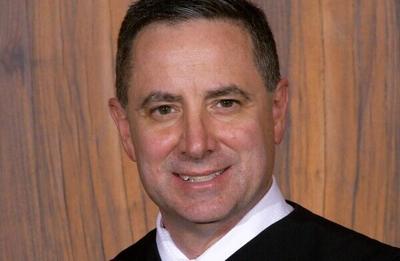
Illinois Supreme Court Justice David Overstreet
SPRINGFIELD - The Illinois Supreme Court has ruled the state isn’t obligated to pay legal fees to a therapist, even though he defeated a state licensing board's attempt to force him to unseal professional notes concerning the substance abuse treatment of a physician seeking to restore his professional license.
Justice David Overstreet wrote the unanimous opinion, filed Sept. 18. The decision resolved a matter linked to an underlying dispute that started in 2024 when the Illinois Department of Financial and Professional Regulation reached a consent order to suspend the medical and controlled substances licenses of Dr. Anil Ramachandran.
Following that decision, Ramachandran worked with the Illinois Professional Health Program and Terrence Lavery, a licensed clinical therapist, to complete substance abuse rehabilitation. When Ramachandran sought to have his licenses restored to continue working as a certified drug and alcohol counselor, Lavery testified before an administrative law judge about the recovery plan.
That testimony, Overstreet wrote, revealed “the existence of personal notes that Lavery made and kept in connection with the mental health services he provided. The (IDFPR) asked Lavery for a copy of Lavery’s personal notes, but Lavery rejected the request on the basis that his personal notes were his work product that he was not required to disclose under the terms of the Confidentiality Act.”
Lavery sought a protective order as part of that proceeding, but the administrative law judge denied the motion and ordered Lavery to produce his notes. He and his employer then asked a circuit court judge for a protective order while also requesting they be awarded compensation for the legal expenses associated with keeping the notes private. The judge agreed the Confidentiality Act protected the notes; IDFPR did not challenge that finding.
However, the judge also agreed Lavery and IPHP were entitled to $10,639 in legal fees. IDFPR appealed and argued, for the first time, that sovereign immunity bars a state agency from being compelled to pay the legal fees of the prevailing party in the same manner as a private entity. A state appeals panel agreed with Lavery, finding the legal fees were “properly characterized” as supportive of the request for a protective order and not a distinct request for financial damages.
Overstreet explained how the Illinois state constitution allows the General Assembly to establish the conditions under which the state can be sued and said regulations under the State Lawsuit Immunity Act and Court of Claims Act require considering whether a circuit court judge is authorized to enter a judgment requiring a state agency to pay.
When the appeals panel agreed to let the legal fees award stand, Overstreet explained, it did so “based on the prospective injunctive relief exception to sovereign immunity,” which allows state court lawsuits to protect certain legal interests. The panel further reasoned “it had subject-matter jurisdiction to enter the monetary judgment irrespective of the existence of any explicit waiver of sovereign immunity by the legislature.”
Overstreet said the exemption has a complex history, and noted that earlier this year, in Walker v. Chasteen, the Illinois Supreme Court “suggested that cases involving the prospective injunctive relief exception are cases that, in substance, are not actions against the state” because if someone is acting outside the law, they have lost the legal authority of their official status.
“The state cannot justifiably claim interference with its functions when a proposed future act by a state agent is unauthorized or illegal,” Overstreet wrote. “In addition, such prospective injunctive relief does not normally impact the state’s coffers.”
Sovereign immunity is intended to protect the government not just from litigation, but the financial implications of adverse judgments, even when the state fails in a prosecution, Overstreet said. He added that the General Assembly has “exclusive authority over the terms and conditions upon which the state may be subject to a monetary judgment” and said that “with respect to an award for litigation expenses, it has been long established that a party may not recover from the state, or one of its agencies, attorney fees or other litigation costs in a civil action unless there is affirmative statutory language reflecting the state’s consent to the imposition of costs against it.”
Finding no such language in the Confidentiality Act under which Lavery and his employer sought protection, the Supreme Court said the plaintiffs aren’t able to force the IDFPR to pay their legal bills. Overstreet framed the appellate ruling as usurping the legislative branch’s exclusive authority and established that the circuit court also lacked the jurisdiction to enter the judgment in the first place.






